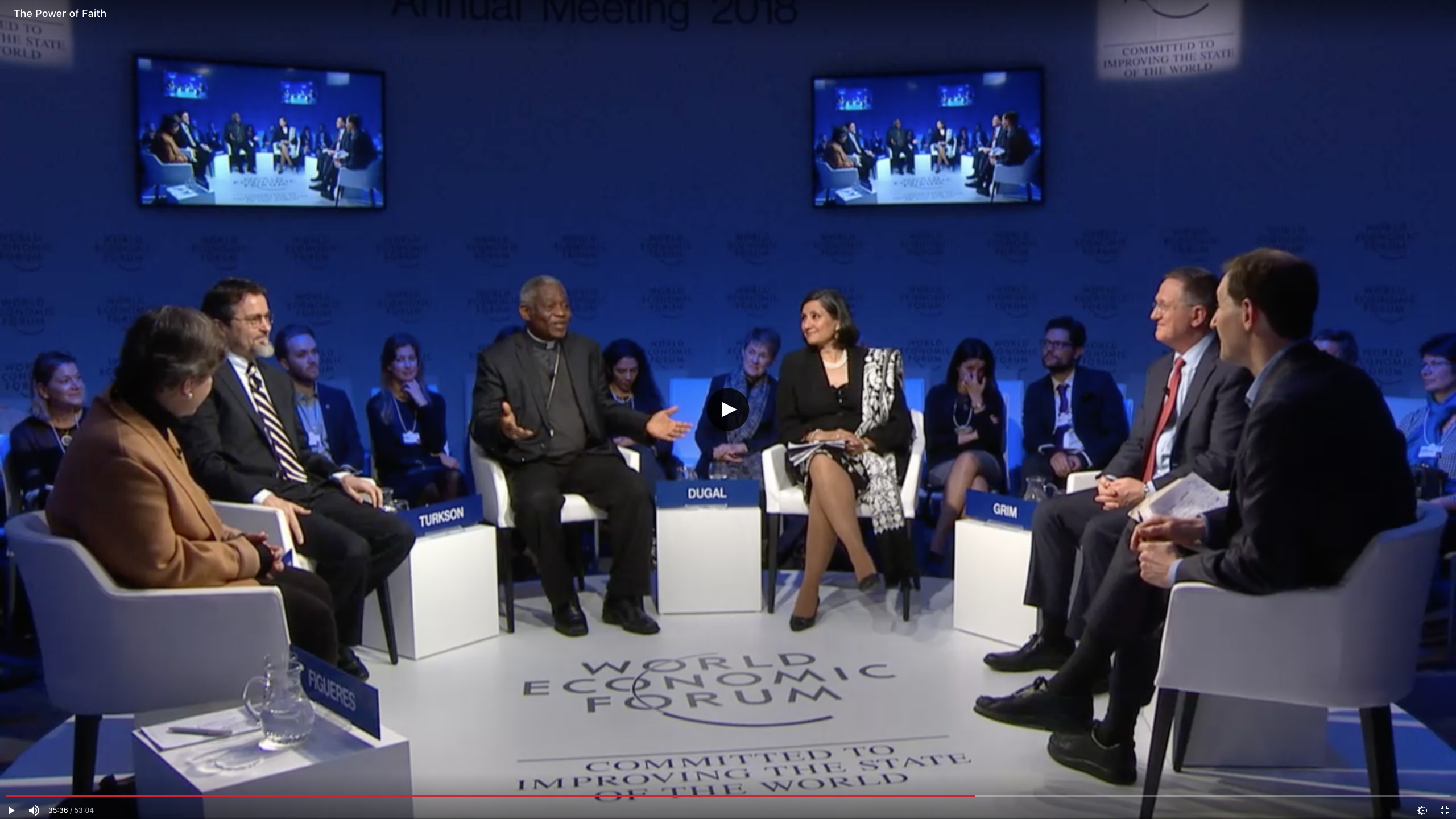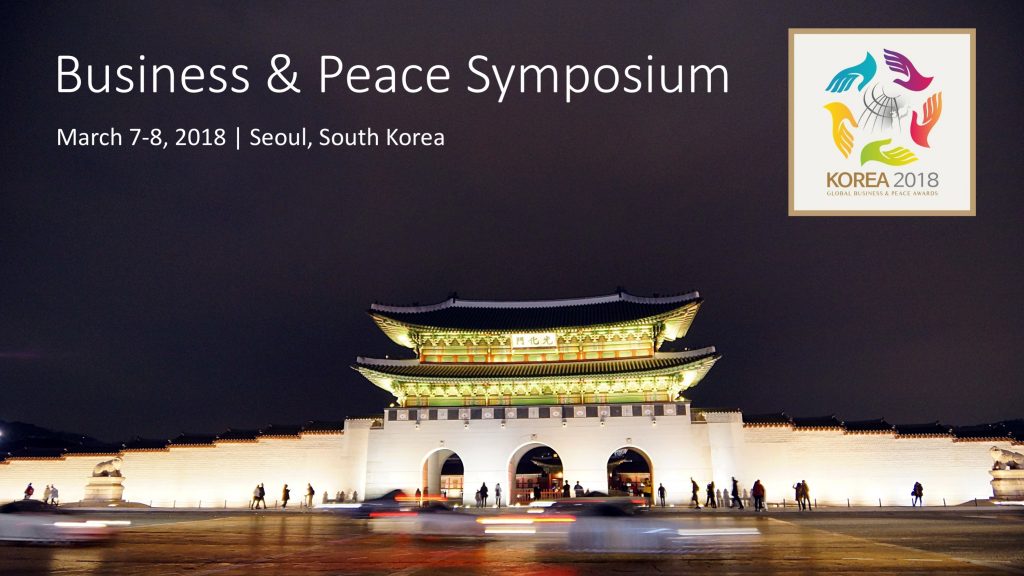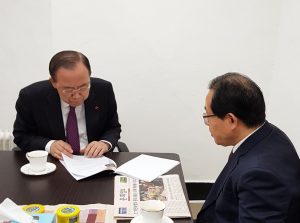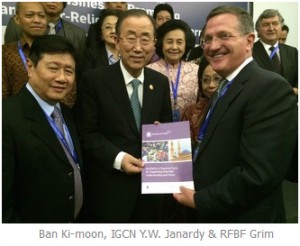
Brian Grim, at the World Economic Forum in Davos
Image from White House homepage links to Jan. 16, 2018 Presidential Declaration
Davos is not a particularly friendly place for Pres. Donald Trump and his mission ‘to make America great again.’ The annual meeting of the World Economic Forum attracts a fair number of people who see Trump’s vision as nationalistic and counterproductive to the type of global cooperation espoused here – working together to solve the world’s problems. This is the very type of cooperation Pope Francis called for in his address (read by Cardinal Turkson). Significantly, Pope Francis’s comments were the first to be made at this year’s meeting.
It is commendable that Pres. Trump is willing to come face a crowd this Friday that is not likely to cheer his vision. To be clear, this is a risky gamble that could backfire. Yet, it might be a forum where the ‘businessman side’ of the President connects with the massive gathering of CEOs and world leaders.
This gathering affords Pres. Trump the opportunity to tout America’s economic vibrancy as well as the civic virtues that have made the U.S. a model for many in the world. One such civic virtue is religious freedom and how it is a pillar of America’s economic vibrancy.
Religious freedom in the United States sets religious organizations and people free to annually contribute nearly $1.2 trillion of socio-economic value to the U.S. economy, according to a September 2016 first-of-its-kind study published in the Interdisciplinary Journal of Research on Religion (see wide global press coverage of the study).
- — That is equivalent to being the world’s 15th largest national economy, putting it ahead of about 180 other countries.
- — It’s more than the annual revenues of the world’s top 10 tech companies, including Apple, Amazon and Google.
- — And it’s also more than 50% larger than that of the annual global revenues of America’s 6 largest oil and gas companies.
So – you might say – that represents a lot of spiritually inspired fuel being pumped into the U.S. economy.
Religion does play a unique role in the socio-economic behaviors of Americans. For example, adults who are highly religious are significantly more likely than those who are less religious to report they did volunteer work and made donations to the poor in the past week, according to the Pew Research Center.
The contributions of religion to American society fall into three general categories:
- — $418 billion from religious congregations
- — $303 billion from other religious institutions
- — $437 billion from faith-based, faith-related or faith-inspired businesses
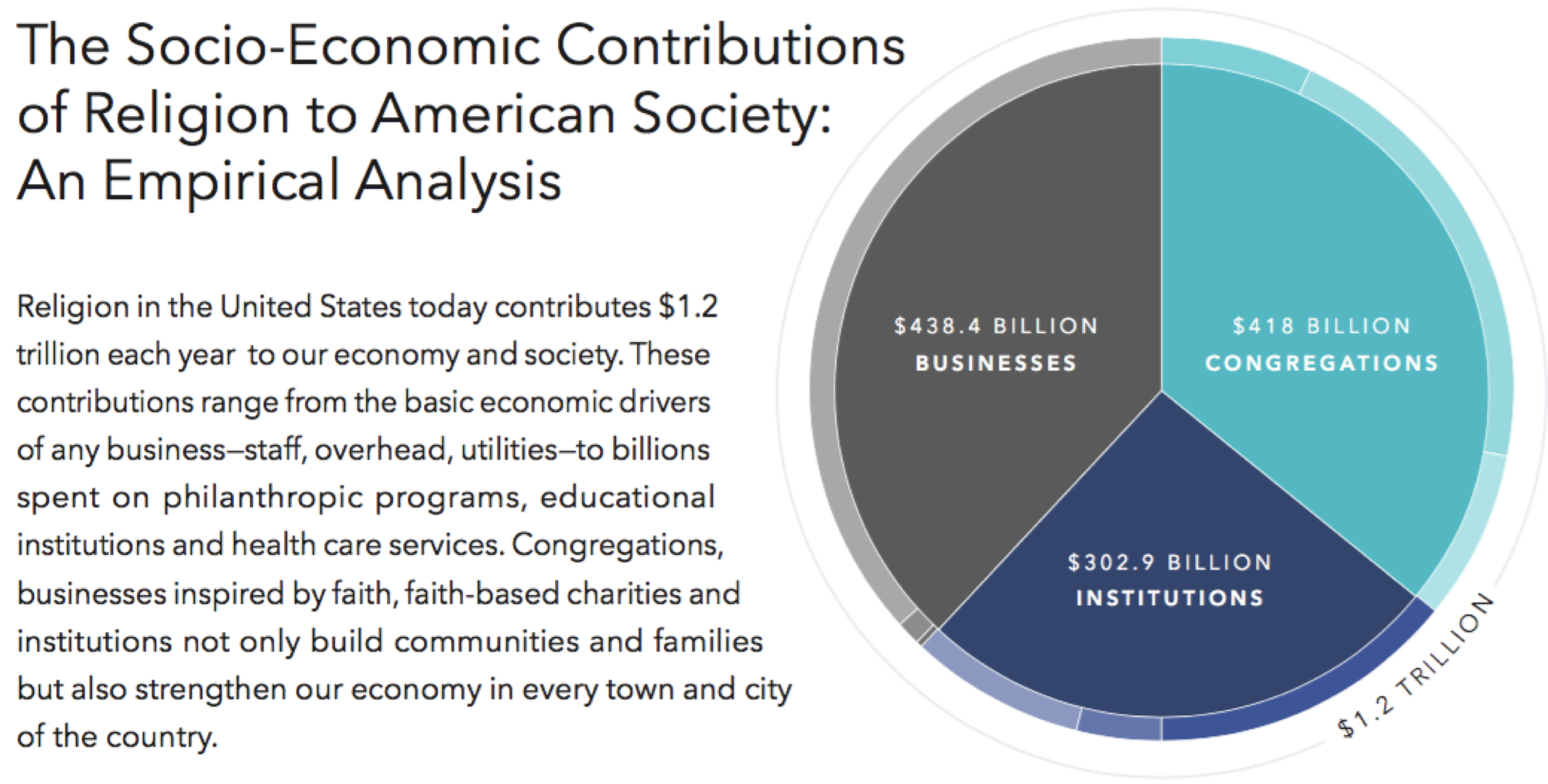 All these figures come from a careful analysis of survey and financial data from a wide range of national sources detailed in the research article in the Interdisciplinary Journal of Research on Religion, including:
All these figures come from a careful analysis of survey and financial data from a wide range of national sources detailed in the research article in the Interdisciplinary Journal of Research on Religion, including:
- — National Congregations Study
- — Religious Congregations and Membership Study
- — Private School Universe Survey
- — Institution of Education Sciences
- — Becker’s Hospital Review
- — Revenue reports of faith-based health organizations, charities & businesses
- — Faith-related business data by Oxford University’s Said Business School Professor Theodore Roosevelt Malloch
- — Congregational “halo effect” analysis by University of Pennsylvania Professor Ram Cnaan
- — World Economic Forum’s Global Agenda Council on the Role of Faith
Each year congregations spend $84 billion on their operations ranging from paying hundreds of thousands of personnel, to paying for goods and service as diverse as flowers, sounds systems, maintenance, and utilities. Almost all being spent right in the local community.
Schools attached to congregations employ 420,000 full time teachers and train 4.5 million students each year. By comparison this is the same number as the total population of Ireland or New Zealand.
Congregations are like magnets attracting economic activity ranging from weddings, as I’ve already mentioned and can give personal detail on, to lectures, congresses, and even tourism. For instance, 120,000 congregations report that people visit them to view their art and architecture.
And most importantly, it’s what congregations do in their communities that makes the biggest socio-economic contribution. These programs impact individuals and families in a variety of important ways. For example:
- — Congregations provide 130,000 alcohol recovery programs such as The Saddleback Church “Celebrate Recovery” program that has helped over 27,000 individuals over the past 25 years.
- — Congregations provide 120,000 programs to help the unemployed. For example, The Church of Jesus Christ of Latter-day Saints has employment service centers in each of their stakes across the country (and across the world), for that matter.
Some of this work runs counter to stereotypes some may have about religious groups. For instance,
- — Nearly 26,000 congregations are engaged in some form of active ministry to help people living with HIV-AIDS. That makes one HIV-AIDS ministry for every 46 people who are HIV positive. Just this past weekend on 9/11, under the sponsorship of Walgreen’s and the “First Ladies” (pastors’ wives) of Chicago, nearly 50 Chicago churches hosted free screening for HIV and other diseases.
- — In fact, the data show that congregations overwhelmingly include a society-building, outward community focus, with over 320,000 congregations helping to recruit volunteers for programs outside their walls, to non-religious groups, ranging from Big Brothers and Big Sisters to the United Way and the American Red Cross.
One story among thousands of how a congregational school impacts individuals who then impact the community for good comes from inner city Newark, NJ. St. Benedict’s Prep readies 530 mostly poor, mostly minority boys for college and beyond. In an area where public schools are working hard just to keep young men from ending up in gangs, in jail or dead, St. Benedict’s sends 95% of its graduates to college, including a sizable number to Ivy League schools.
And graduates, such as Uriel Burwell, return to make an impact. Upon graduating from Drew University, Uriel returned to his childhood neighborhood to build 50 new affordable houses, rehabilitate more than 30 homes and attracted more than $3 million funding to build additional affordable homes and apartments in the area.
Religious Institutions: If we extend our view beyond what happens at local congregations and schools, we can find tens of thousands of other religiously-affiliated charities, health care facilities, and institutions of higher learning also doing these sorts of good works every day. These add another $303 billion of socio-economic impact to the US economy each year. These includes:
- — Charities such as the Knights of Columbus whose 1.5 million members respond to disasters and other human needs
- — Health care services such as provided by the Adventist Health Systems which employ 78,000 people in 46 hospitals
- — Institutions of higher education such as Brandeis University which is one of thousands of religiously-based colleges throughout the country
- — I could go on for hours describing such as institutions as Islamic Relief USA, which responded to the water crisis in Flint, Michigan, by hiring 20 local staff and distributing 135,000 gallons of water during the height of the water crisis.
- — Rather than continuing to give examples, I will now move to the third sector, business
Businesses: Religion related business add another $438 billion to the US economy each year. These include faith-based businesses, ranging from the Halal and Kosher food industries to religious media such as EWTN and the Christian Broadcast Network.
The largest group within this sector are not religious companies, per se, but are faith-inspired or religion-friendly companies. Tyson’s Foods, for example, employs a large force of chaplains for their multi-religious workforce.
Across the country there are associations of CEOs who seek to put the moral and ethical teachings of their faith to practice in their business. One such association is C12 with over 2,500 members, some of whom have business worth billions of dollars.
Let me conclude with example showing how one American CEO, motivated by his faith, has started a company in Mozambique that not only stocks the shelves of America’s major food stores – from Giant and Wegmans to Whole Foods and H.E.B. – but empowers tens of thousands of people. His innovative business model is based on what he calls a “reverse tithe” – where 90% of profits go back into the local community. That means many American consumers are participating in a faith endeavor, perhaps unaware.
As President Trump comes, I for one hope it warms global relations by his sharing about some of America’s tremendous civic virtues, like freedom of religion or belief for all.
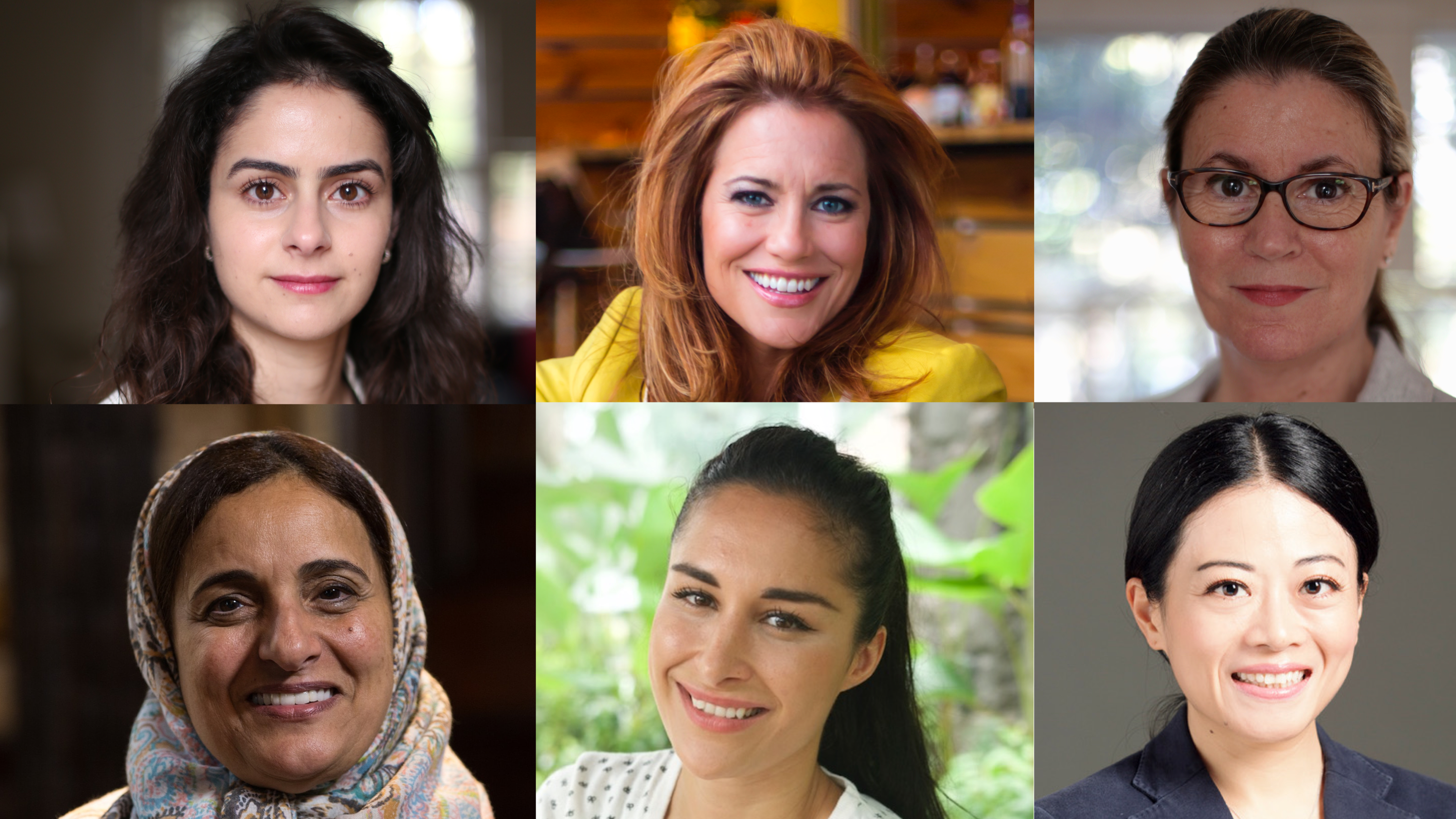 Come meet these top female leaders — three business execs and three filmmakers — at the 2018 Global Business & Peace Awards and Symposium in Seoul, Korea, on March 7-8, 2018.
Come meet these top female leaders — three business execs and three filmmakers — at the 2018 Global Business & Peace Awards and Symposium in Seoul, Korea, on March 7-8, 2018.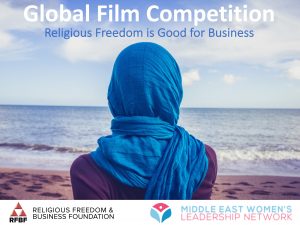 The grand prize winner of the competition will receive $5,000 and a trip to present her work at the Peace Awards ceremony. Additionally, the wining films will be shared with religious freedom networks, NGOs, government and faith based organizations around the world.
The grand prize winner of the competition will receive $5,000 and a trip to present her work at the Peace Awards ceremony. Additionally, the wining films will be shared with religious freedom networks, NGOs, government and faith based organizations around the world.







